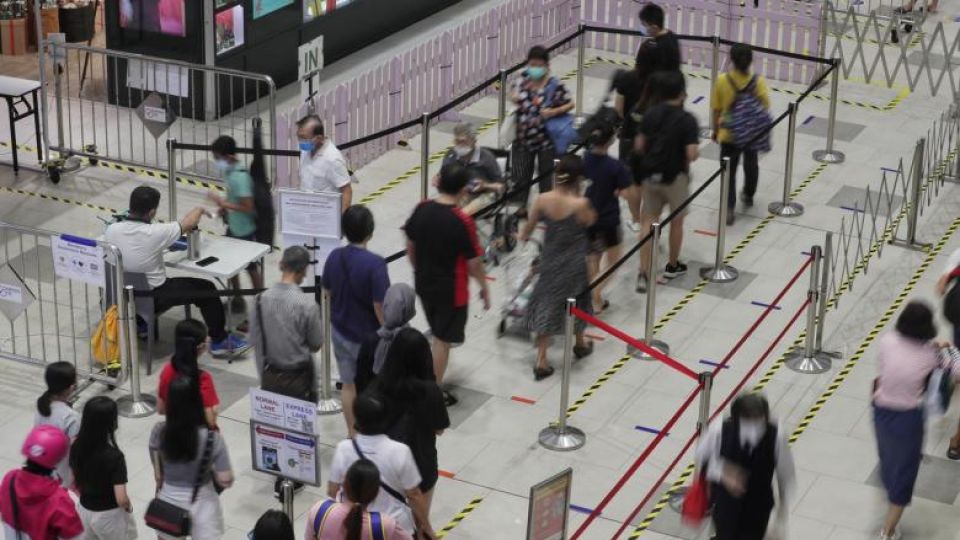December 29, 2021
SINGAPORE – It makes sense to treat the Omicron variant as no different from other existing and past Covid-19 variants, said experts, since evidence has shown that the new strain is likely to be more transmissible but less severe than the Delta variant.
Since Monday (Dec 27), those infected with the Omicron variant were allowed to recover from home or in community care facilities, after about a month of strict measures to reduce and slow down the spread of Omicron in Singapore.
Over the past month, those infected with Omicron were either isolated at the National Centre for Infectious Diseases or at dedicated facilities.
Close contacts were quarantined for 10 days at designated facilities, and full contact tracing was carried out.
“If Singapore still continued to treat the Omicron variant differently, (such as) hospitalise infected patients, then we will be at risk of scoring an ‘own goal’ in terms of filling up our healthcare facilities with relatively well patients,” said Associate Professor Hsu Li Yang, an infectious diseases expert at the National University of Singapore’s (NUS) Saw Swee Hock School of Public Health.
The school’s vice-dean of research, Associate Professor Alex Cook, said: “I don’t think we could maintain strict contact tracing and isolation for long for Omicron anyway, and we would want to avoid revisiting the situation a few months ago when we had to repeatedly revise the eligibility criteria for home isolation.”
The Ministry of Health (MOH) said on Sunday that Singapore’s Omicron cases so far had not been severe, with none requiring intensive care (ICU) or oxygen supplementation.
But the ministry noted that this may be partially due to most cases being fully vaccinated and from younger age groups.
Professor Paul Tambyah, president of the Asia Pacific Society of Clinical Microbiology and Infection, said: “Now that we know that the Omicron variant is probably a lot less virulent than the previous dominant strains, we can move closer back to treating Covid-19 like other potentially deadly contagious respiratory infections such as tuberculosis or influenza.”
But it was prudent and crucial to have strictly ring-fenced the Omicron cases over the past month, as it allowed the country to buy time and let the science catch up with the concerns about the new strain, said Professor Dale Fisher, senior consultant at the National University Hospital’s Division of Infectious Diseases.
“Once a variant is identified, it will take some weeks to understand the outcomes. This was about slowing the entry and spread of Omicron until we knew the disease was not escaping the vaccine’s protection and was not more severe,” he added.
Professor Teo Yik Ying, dean of NUS’ Saw Swee Hock School of Public Health, said the past month of containing Omicron allowed the country to roll out the boosters to more people and plan on expanding its ICU capacity.
It was announced on Dec 14 that Singapore is making plans to increase its ICU capacity to 500 beds, up from 280, to brace itself for an Omicron wave.
Prof Fisher observed that Singapore is one of the earliest countries to accept that Omicron is not threatening nationally, because a large proportion of the population is vaccinated.
“Some countries are seeing overwhelmed hospitals again because Omicron is more transmissible and the baseline immunity of the population is still low.
“Singapore is realising the strategy of Covid-19 resilience, such that as new variants arise, they can be dealt with quite easily.”
But having to deal with Omicron after a long and hard battle with Delta is damaging to people’s mental and physical well being, the experts said.
Prof Teo said: “The costs are definitely economic, and the overall mental well-being of our people, since we saw a suspension of our VTLs (vaccinated travel lanes) as well as a constant shadow cast over the economy by Omicron.”
MOH had last Wednesday announced the suspension of all VTL ticket sales for entry into Singapore between Dec 23 and Jan 20.
Finance Minister Lawrence Wong said in a Facebook post on Monday that the Republic must expect a new wave of Covid-19 cases in the coming days and weeks due to Omicron.
As at Saturday, there were 546 confirmed Omicron cases here, of which 443 were imported and 103 were local cases.
With Omicron’s higher transmissibility, it is likely that the Omicron wave would lead to more infections compared with the Delta wave over the past few months, said experts.
But if severe disease, hospitalisations and ICU admissions do not escalate, transmissions of mild disease of any variant does not matter so much, said Prof Fisher.
“We shouldn’t panic just because we see more cases. I do expect this to occur with Omicron and indeed with future variants and even seasonal fluctuations.”
Prof Cook said that the country should take stricter action to arrest the growth of Omicron only if the number of severe cases rises.
Prof Hsu’s main concern is about children below 12 who may be unvaccinated during the wave, given that the vaccination drive for upper primary students just started.
“School is due to start next week and the majority may not complete their vaccination by the time our own Omicron wave peaks. We may see more hospitalisations among this group, even though the variant is not as deadly as Delta,” he added.


